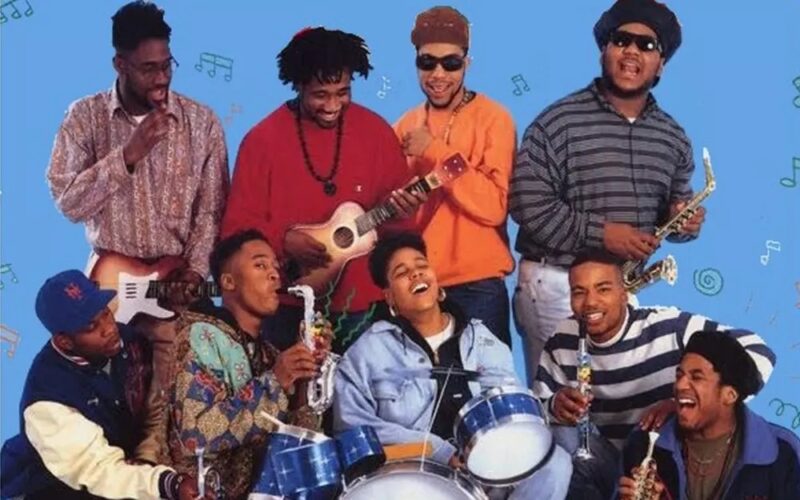A hip-hop syllabus—for fans, by fans.
Questlove, best known as one of the more famous drummers to ever live and co-founder of The Roots, released a memoir this month called Hip-Hop is History. Co-written with his regular collaborator, Ben Greenman, this personal narrative builds on a growing canon of hip-hop lit. Fans will be pleased to know that there’s a lot of industry tea spilled. But there’s also a guiding arc to this autobiography, which traces the rise of hip-hop as an art form.
The collections below also explore the best American music form (there, I said it) as both a cultural phenomenon and a revolutionary force. The authors are theorists, critics, and historians. But before all that? They were just like Questlove. Which is to say, they were fans.
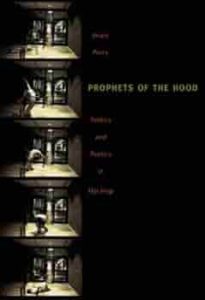
Imani Perry, Prophets of the Hood: Politics and Poetics in Hip-Hop
This one came up on a recent episode of Reckon True Stories, the excellent new podcast from authors Kiese Laymon and Deesha Philyaw. Perry’s close looks at Lil’ Kim, Outkast, and De La Soul (among other groups) are trenchant and wise. This is a work of readable narrative scholarship, nestled in a fan letter but predicated on the Afrocentric argument that hip-hop is “an art of innovation, not deprivation.”
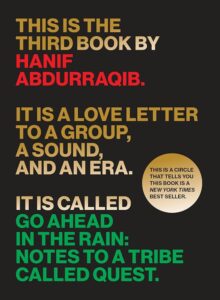
Hanif Abdurraqib, Go Ahead in the Rain
I hope you’ve already read this one, so this list can merely excite a reminder to pick it up again. Abdurraqib is one of our best working, and this open-hearted inquiry is an excellent tribute to an excellent group. I mean if you like music—or let’s say, if a musical group has ever given you meaningful comfort—Abdurraqib’s writing for you.
Though this one is a praise note written in part to the late Phife Dawg (of Tribe), Abdurraqib engages deeply and critically with the affect and effects of hip-hop’s ur-group. Read this one with People’s Instinctive… on low, and a candle burning.
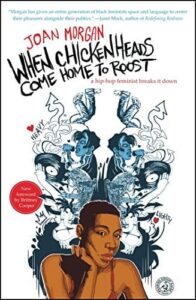
Joan Morgan, When Chickenheads Come Home to Roost: A Hip-Hop Feminist Breaks it Down
The music journalist Joan Morgan coined the term “hip-hop feminist” in the 90s. Since then, that moniker has been claimed by a whole new generation of Black feminist scholars, including Brittney Cooper. This is a provocative, funny time capsule of a memoir-in-essays, brimming with shrewd and prescient takes on feminism’s political limits and misogynoir.
It’s not an overt hip-hop history like the other books on this list, but it does tackle the conundrum of being a femme fan of a medium that has historically dehumanized and sidelined Black women. For those craving the more exhaustive critical history, peep Morgan’s latest: She Begat This: 20 Years of The Miseducation of Lauryn Hill.
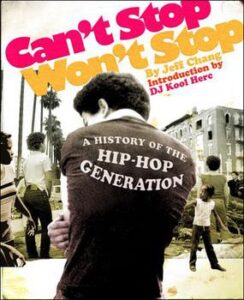
Jeff Chang, Can’t Stop Won’t Stop: A History of the Hip-Hop Generation
I remember this book sitting pride of place on the Barnes and Noble bestseller table for several years of high-school. Turns out it stands the test of time. This ambitious history is “a record of the cultural movement the music inspired,” more than a deep dive into any particular artist. A wide net is cast. (Though OutKast fans may quibble with the skimpy engagement with the Dirty South.)
Chang’s reportage illustrates how socioeconomic forces and marketplace pressure shaped this music and its listeners over time. He’s observant on what we might call elite capture today. This book asks a few questions. What was hip-hop culture? And what might it be?
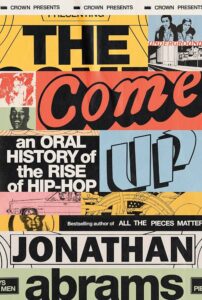
Jonathan Abrams, The Come Up: An Oral History on the Rise of Hip-Hop
A thrilling primer for the general fan, this new and well-woven oral history consists of more than three hundred interviews with execs, artists, DJs and industry king/queen-makers. A sea of fan-pleasing anecdotes are smartly sequenced to describe the medium’s whole—well—come-up. East coast and West coast get their dues. We get some compelling dissent between factions. And happily, this doorstop doesn’t merely focus on the stars. For every Ice Cube, there’s someone you should know better.
Like MC Debbie D.
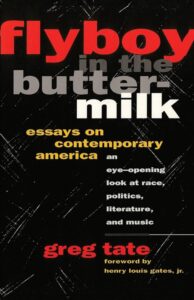
Greg Tate, Flyboy in the Buttermilk: Essays on Contemporary America
I geeked out earlier this year about Tate’s inimitable critical chops. The late, great author had capacious music tastes. He wrote a book about Jimi Hendrix, co-founded the Black Rock Coalition, and played in several acid funk bands. But his hip-hop writing—see a fan letter to the “polyglot ardor” of De La Soul—is some of his best.
Tate’s a stylish wizard with the pen. As the historian Robin D.G. Kelley put it in Boston Review, “He was to the 1980s and ’90s generation what Amiri Baraka and A. B. Spellman (fellow Howard alums) were to that of the 1960s.” Other essays in this collection sit with Public Enemy and Ice-T.
Go ahead in the read.
Image of Native Tongues via


